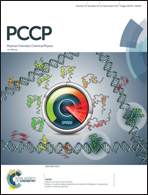Quantum confinement of molecular deuterium clusters in carbon nanotubes: ab initio evidence for hexagonal close packing†
Abstract
An ab initio study of quantum confinement of deuterium clusters in carbon nanotubes is presented. First, density functional theory (DFT)-based symmetry-adapted perturbation theory is used to derive parameters for a pairwise potential model describing the adsorbate–nanotube interaction. Next, we analyze the quantum nuclear motion of N D2 molecules (N < 4) confined in carbon nanotubes using a highly accurate adsorbate-wave-function-based approach, and compare it with the motion of molecular hydrogen. We further apply an embedding approach and study zero-point energy effects on larger hexagonal and heptagonal structures of 7–8 D2 molecules. Our results show a preference for crystalline hexagonal close packing hcp of D2 molecules inside carbon nanotubes even at the cost of a reduced volumetric density within the cylindrical confinement.

- This article is part of the themed collection: 2017 PCCP HOT Articles


 Please wait while we load your content...
Please wait while we load your content...